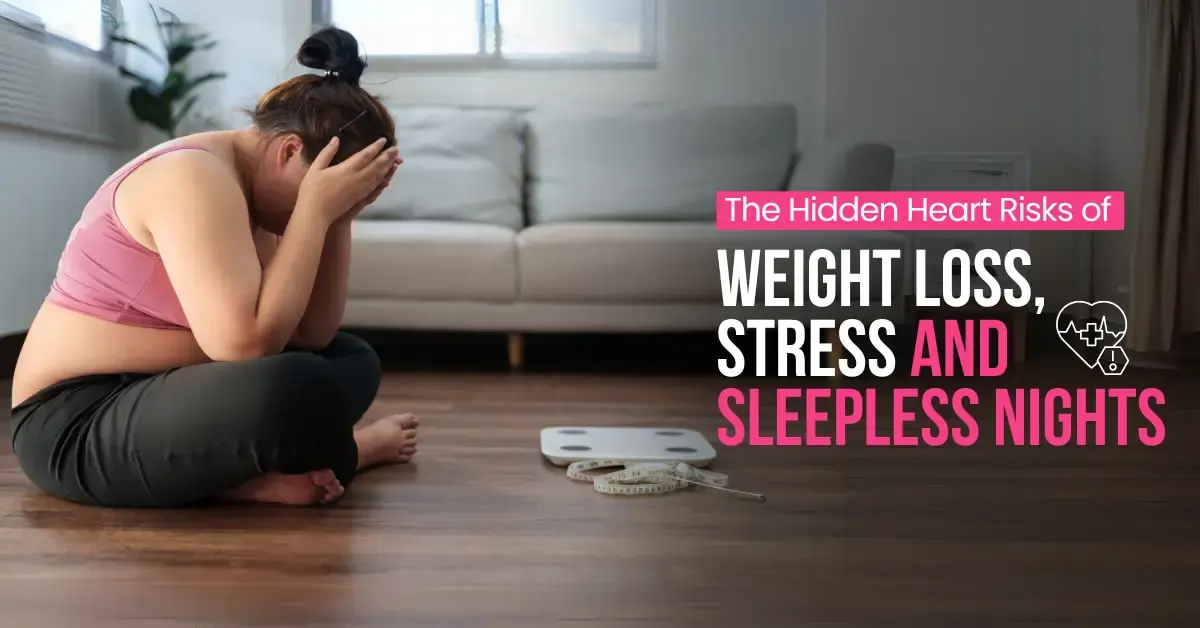Let’s explore how weight loss and heart disease, along with stress and sleepless nights, may silently be harming your heart without you even realizing it. When we talk about heart health, most people only think of cholesterol or blood pressure. But did you know that your weight loss routine, your everyday stress, and even how well you sleep can silently increase your heart risk?
Let’s explore how weight loss and heart disease are often connected and how these everyday habits may be silently affecting your heart health.
Weight Loss and Heart Health: Why Rapid Fat Loss Can Be Dangerous
Quick fixes and crash diets may seem tempting when you’re eager to shed weight, but rapid weight loss and heart disease can have serious consequences on your cardiovascular health. But drastic changes in body weight, especially from unbalanced diets or extreme exercise, can strain your cardiovascular system. When your body is suddenly deprived of essential nutrients like potassium, magnesium, and healthy fats, your heart muscles can weaken. This can lead to irregular heartbeats or even increase the chances of cardiac arrest in some individuals.
At Q-Slim Fitness Studio, we always advocate for gradual, sustainable weight loss under expert guidance. Our personalized fat loss plans prioritize heart-safe nutrition and hormone balance.
Stress and Heart Disease: How Chronic Stress Damages Your Heart
Stress is often called the silent killer, especially when combined with weight loss, as it can contribute to the development of heart disease over time. When you’re constantly under pressure — whether from work, family, or even the constant urge to look a certain way — your body releases stress hormones like cortisol and adrenaline. These hormones can:
- Increase blood pressure
- Tighten blood vessels
- Lead to high cholesterol and sugar levels
Over time, this chronic state can seriously damage your heart. According to experts, mental stress is now a bigger risk factor than smoking for heart disease among Indian women.
A great way to start managing your stress naturally is by practicing mindful eating. You can read our blog on How to Manage Food Cravings the Healthy Indian Way to learn how small habits help you stay calm and in control.
Sleeplessness and Heart Problems: The Overlooked Link to Heart Disease
It’s easy to underestimate the power of good sleep, especially in a world where poor sleep, combined with stress and weight loss, contributes significantly to heart disease risks. But sleep deprivation:
- Raises inflammation in the body
- Increases hunger hormones (making weight loss harder)
- Reduces your heart’s ability to rest and recover
Studies show that even one week of poor sleep can spike your blood pressure. Over time, this damages the blood vessels and raises the risk of heart attacks.
Hidden Heart Risks: Are You Ignoring the Warning Signs?
Many women between 30 and 45 are unknowingly at risk. Some of the most common warning signs include:
- Palpitations or irregular heartbeat
- Extreme tiredness even after rest
- Feeling anxious or breathless without reason
- Poor sleep, especially if you wake up feeling unrested
These symptoms are often brushed off, especially when you’re on a strict diet or working hard to lose weight. But ignoring them can be dangerous.
Protecting Your Heart During Weight Loss: 4 Safe, Science-Backed Tips
Here’s how you can stay fit and lose weight without increasing your risk of heart disease:
1. Choose Balanced Diets Over Fads
Avoid keto, zero-carb, or soup-only diets. Instead, opt for balanced Indian meals rich in fiber, healthy fats, lean protein, and heart-healthy herbs.
Explore our Detox & Metabolism Booster Wrap — a supportive therapy that helps reduce water retention and supports natural detox without harsh chemicals.
2. Sleep 7–8 Hours Daily
Create a calming sleep routine: cut down on screen time, avoid caffeine after 4 pm, and try herbal teas or guided meditation for better rest.
3. De-Stress Daily
You don’t need an hour. Just 10–15 minutes of deep breathing, gratitude journaling, or walking barefoot on grass can reduce your cortisol levels.
4. Consult a Nutritionist
Every body is different. Before starting any major diet or fitness plan, talk to an expert who can guide you with safe, personalized plans.
Want to discuss your health concerns? Talk to us directly for a one-on-one consultation with our certified team.
Heart Health Comes First: Final Thoughts for Indian Women Prioritizing Wellness
Weight loss should never come at the cost of your heart. Stress and poor sleep are not just lifestyle issues — they are medical red flags. By balancing your diet, listening to your body, and sleeping well, you can lose fat and gain health without increasing your risk of a heart attack.
Stay safe. Stay informed. Stay empowered.
❓ FAQ Section
Q. Can stress really cause heart attacks?
Yes. Chronic stress leads to inflammation and high blood pressure, both of which damage heart arteries over time.
Q. How much weight loss is considered safe per week?
Losing 0.5 to 1 kg per week is considered healthy. Anything faster could stress your organs, including the heart.
Q. Is lack of sleep worse than smoking for heart health?
Both are harmful. However, poor sleep combined with stress and poor diet can be just as damaging.
Q. Can young women have heart attacks?
Absolutely. Women in their 30s and 40s are increasingly facing cardiac events, often triggered by stress, poor sleep, or extreme diets.

